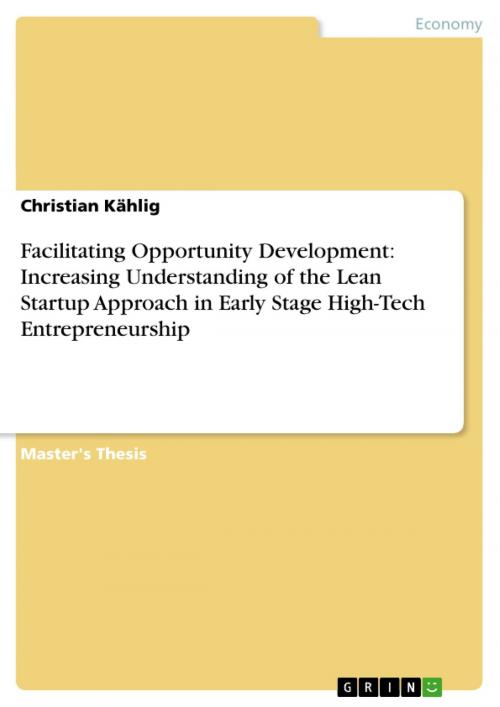Facilitating Opportunity Development: Increasing Understanding of the Lean Startup Approach in Early Stage High-Tech Entrepreneurship
Business & Finance, Entrepreneurship & Small Business, New Business Enterprises| Author: | Christian Kählig | ISBN: | 9783640951079 |
| Publisher: | GRIN Verlag | Publication: | July 5, 2011 |
| Imprint: | GRIN Verlag | Language: | English |
| Author: | Christian Kählig |
| ISBN: | 9783640951079 |
| Publisher: | GRIN Verlag |
| Publication: | July 5, 2011 |
| Imprint: | GRIN Verlag |
| Language: | English |
Master's Thesis from the year 2011 in the subject Business economics - Company formation, Business Plans, grade: 1.0, Technical University of Munich, course: Entrepreneurial Opportunity Development, language: English, abstract: The research objective of this study was to explore how the startup idea development progress was experienced by entrepreneurs and how the Lean Startup Approach (LSA) affected that progress in early stage high-tech entrepreneurship. The Lean Startup movement has gained a lot of traction not only in the Silicon Valley area, but also to some extent in Europe. However, with increasing popularity, criticism starts to get formulated as well. Due to the limited coverage of the LSA, its principles and related management practices in academic literature, it remains difficult to critically assess the validity and effectiveness of the proposed concept. With this study, light is shed on the LS phenomenon by interviewing representative high-tech entrepreneurs and leading proponents of the LS principles and practices. In order to better understand LS principles at work with an emphasis on experienced startup idea development progress, semi-structure interviews with seven Lean Startup Machine (LSM) event participants as well as one mentoring subject matter expert were conducted. The interviewed practitioners were purposely selected from the most and least performing teams according to the appraisal of the LSM event judges. The main reason for choosing the LSM event is the fact that the LSM projects, while somewhat artificial, do provide condensed versions of real life startups, which provides a high information to effort ratio to me as a researcher. Furthermore, a LSA survey tailored to the opportunity development process and a post-LSM-event survey were conducted. The purpose of the multiple mini-cases study (which treated each team working on an entrepreneurial idea as a mini-case) was to explore the opportunity development progress and the role of LS principles and practices from the perspective of consumer Internet high-tech entrepreneurs and LS proponents (mentors) in a highly time-constrained real world LS practitioner event in the USA. Learning about how participants of the event perceived and experienced development progress and the LSA provided insights into the relevance of the LS methodology as a means to accelerate the development progress of an early stage startup idea towards a viable opportunity.
Master's Thesis from the year 2011 in the subject Business economics - Company formation, Business Plans, grade: 1.0, Technical University of Munich, course: Entrepreneurial Opportunity Development, language: English, abstract: The research objective of this study was to explore how the startup idea development progress was experienced by entrepreneurs and how the Lean Startup Approach (LSA) affected that progress in early stage high-tech entrepreneurship. The Lean Startup movement has gained a lot of traction not only in the Silicon Valley area, but also to some extent in Europe. However, with increasing popularity, criticism starts to get formulated as well. Due to the limited coverage of the LSA, its principles and related management practices in academic literature, it remains difficult to critically assess the validity and effectiveness of the proposed concept. With this study, light is shed on the LS phenomenon by interviewing representative high-tech entrepreneurs and leading proponents of the LS principles and practices. In order to better understand LS principles at work with an emphasis on experienced startup idea development progress, semi-structure interviews with seven Lean Startup Machine (LSM) event participants as well as one mentoring subject matter expert were conducted. The interviewed practitioners were purposely selected from the most and least performing teams according to the appraisal of the LSM event judges. The main reason for choosing the LSM event is the fact that the LSM projects, while somewhat artificial, do provide condensed versions of real life startups, which provides a high information to effort ratio to me as a researcher. Furthermore, a LSA survey tailored to the opportunity development process and a post-LSM-event survey were conducted. The purpose of the multiple mini-cases study (which treated each team working on an entrepreneurial idea as a mini-case) was to explore the opportunity development progress and the role of LS principles and practices from the perspective of consumer Internet high-tech entrepreneurs and LS proponents (mentors) in a highly time-constrained real world LS practitioner event in the USA. Learning about how participants of the event perceived and experienced development progress and the LSA provided insights into the relevance of the LS methodology as a means to accelerate the development progress of an early stage startup idea towards a viable opportunity.















